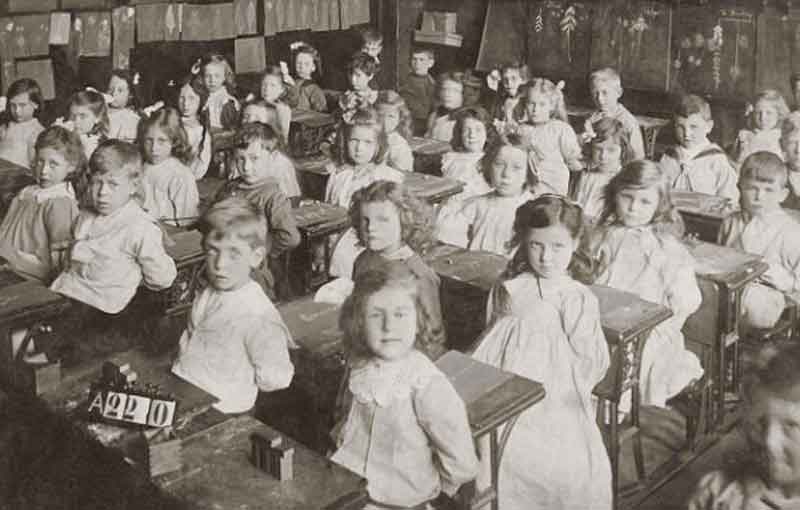 Victorian values: children were kept straight backed by having to sit with their hands folded behind their backs.
Victorian values: children were kept straight backed by having to sit with their hands folded behind their backs.
Ofsted head Sir Michael Wilshaw’s ideas about ‘discipline’ have much in common with Victorian methods and little to do with real education writes John Westmoreland
My Grandmother was a marvellous woman. Born in London in 1891 she was a tough, courageous and highly intelligent woman who could keep me fascinated with her stories for hours on end. I thought about her again today when I heard Michael Wilshaw pronouncing on the need for tougher discipline in schools.
When she went to school in the 1890s it was obvious to her that schooling, as opposed to education, was about modelling an obedient worker. The main thing was discipline! The most prominent features of the school were the clock, the bell and the cane. She and her friends got the cane if they were late. One day she used her powers of reasoning to object. “I had to get my little brother ready and take him to school and he was messing about”. For that she got another whack – the clock would not tolerate contradiction.
In those days posture was important. Tired kids tended to slump, and not pay attention. My Grandmother had to do fine needlework for her tailor father every evening. When the teacher found out she brought in extra sowing for her to do in class. Children were kept straight backed by having to sit with their hands folded behind their backs. If they slumped the cane descended on their shoulders. Crying was forbidden too – silence reigned.
The teachers operated in a way that was utterly oblivious to the political and social context of the time. Britain had an empire and working class kids were going to be made to defend it – with backs straight, ears open and ingrained compliance. Wilshaw’s ideas about ‘discipline’ have much in common with Victorian methods and little to do with real education.
As schools have been ‘liberated’ by various levels of privatisation the Tories’ blood hound Ofsted has increased its remit. If privatisation is going to deliver on the promises of improvement it was sold with, then Ofsted will have to impose iron discipline. Any glimmer of humanity from teachers is being stamped on. Wilshaw warns:
“Headteachers who fail to enforce school discipline and blur the lines between friendliness and familiaritywith unruly pupils, are tolerating behaviour such as humming and fidgeting that disrupts lessons and takes up valuable teaching time”
There has been a resurgence of disciplinarian strategies in recent years, as schools have ben made to compete against each other. Schools are now using ‘robust discipline policies’ as a selling point to prospective parents. Many schools have now embraced ‘assertive’ disciplinary regimes which oblige all teachers to observe the same graduated forms of disciplinary intervention, so the kids know the rules and boundaries, and the teacher is free to teach and children to learn.
Children who cannot tolerate this robotic and totally alienated relationship to the teacher are the ones who will face increased sanctions – verbal warning – detention – parental involvement – exclusion. Often the brightest kid can be denied their own input into the class. This is to the detriment of the class – the opposite of Wilshaw’s claims.
The value of unruly behaviour
An educated person uses their knowledge and skills gained in one area of their education to solve new problems. This quality is the product of intellectual confidence gained by constantly testing and applying what they know, and thereby discovering what more they need to know.
The best questions in class are those that challenge received wisdom and may well be worded aggressively, teasingly or in the form of opposition to the teacher. How else would you expect children whose families are the victims of austerity and neglect to respond?
The right to education that socialists defend is prefaced on the right to test what is being taught – its value, relevance and authority. I am all for working class kids being uppity – my Granny was and she turned out alright. The intervention of the oppositionist in class helps everybody to decide these fundamental questions, and is key to building confidence.
Attacking teachers makes matters worse
Good teachers do of course value classroom discipline and respect – based on genuine agreement between teachers and students that what they are doing together has value. Children who are completely unable to cope in the classroom need extra care and consideration, not the ridiculous ‘either or’ discipline advocated by Wilshaw. As special educator Kyle Marsh has pointed out,
“Teachers rarely just casually accept bad behaviour. Choosing to ignore it can be much more powerful than turning it into a major show of authority. Class issues can often be addressed quietly after class, or with a phone call home.”
There also seems to be a wider goal of making teachers compliant to the dictatorship of competition and achievement. Russell Hobby, general secretary of the National Association of Head Teachers, which represents many primary school heads, accused Ofsted of undermining teachers:
“Ofsted is intentionally adding a note of fear and uncertainty across the education system, seeking to contradict the Department for Education’s attempts to rebuild the shattered confidence of teachers and leaders.
“Ofsted is appearing to set education policy rather than inspect the implementation of policy – and the DfE should be wary of ceding such powers to unelected officials.”
Hobby added: “This continued overreach adds to the evidence that Ofsted has reached the end of the line in its current incarnation, stifling innovation rather than encouraging it.”
Privatisation will result in a dictatorship in schools if the Tories have their way. Campaigning for real education should be at the heart of the fight against austerity.

